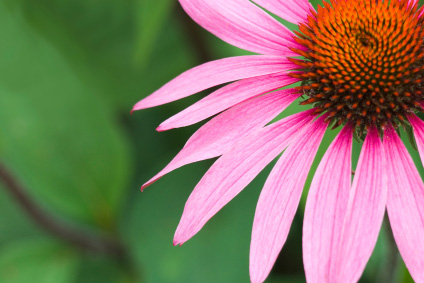 |
 |
 Intuition
is sometimes defined as the sense of knowing something without any
empirical evidence. To some this is a divine source of knowing, while
to others intuition is about listening to instinct. Everyone
experiences flashes of their intuition from time to time – those are
the “ah-ha” moments of understanding. In fact, most people walk around
actively inviting their intuition to step in. This is what you are
doing when you wonder, whether you are wondering about people, places,
facts, ideas, decisions, etc. Intuition
is sometimes defined as the sense of knowing something without any
empirical evidence. To some this is a divine source of knowing, while
to others intuition is about listening to instinct. Everyone
experiences flashes of their intuition from time to time – those are
the “ah-ha” moments of understanding. In fact, most people walk around
actively inviting their intuition to step in. This is what you are
doing when you wonder, whether you are wondering about people, places,
facts, ideas, decisions, etc.
In order to allow your intuition
to guide you, you simply need to relax and listen to yourself. What
some refer to as a gut reaction is often your mind trying to tell you
something. In fact, the term gut reaction is very telling – oftentimes,
large emotions will have a physical affect on our bodies. Our
experiences of joy, sorrow, elation, anger, and fear are all physical
experiences. If you have a physical reaction to something, listen to
what that tells you, rather than ignore it for what you rationally know
is right. Oftentimes, if you take time to honor and examine your
initial emotion, you'll find that what you intellectually desire isn't
actually counter-indicated.
The more you practice opening to
your intuition, the easier it will flow through you. When you first
start consciously calling upon your intuition, make a time and space to
do so. Find a place to sit quietly and close your eyes. Then, call up
the idea that you want to find clarity on and allow thoughts and ideas
to flow into your mind. You don't need to follow any given train of
thought, simply be open to hearing what occurs to you.
Intuition is sometimes
defined as the sense of knowing something without any empirical evidence.
To some this is a divine source of knowing, while to others intuition is about
listening to instinct. Everyone experiences flashes of their intuition
from time to time – those are the “ah-ha” moments of understanding. In
fact, most people walk around actively inviting their intuition to step
in. This is what you are doing when you wonder, whether you are wondering
about people, places, facts, ideas, decisions, etc.
In order to allow your intuition to guide you, you simply need to relax and
listen to yourself. What some refer to as a gut reaction is often your
mind trying to tell you something. In fact, the term gut reaction is very
telling – oftentimes, large emotions will have a physical affect on our
bodies. Our experiences of joy, sorrow, elation, anger, and fear are all
physical experiences. If you have a physical reaction to something,
listen to what that tells you, rather than ignore it for what you rationally
know is right. Oftentimes, if you take time to honor and examine your
initial emotion, you'll find that what you intellectually desire isn't actually
counter-indicated.
The more you practice opening to your intuition, the easier it will flow
through you. When you first start consciously calling upon your
intuition, make a time and space to do so. Find a place to sit quietly
and close your eyes. Then, call up the idea that you want to find clarity
on and allow thoughts and ideas to flow into your mind. You don't need to
follow any given train of thought, simply be open to hearing what occurs to
you.
|
|
 |
 |
Immunity
is an entirely holistic reality. As we all know, it is quite common for
many people to come into contact with a disease but for only a few to
actually contract the disease and suffer its symptoms. This tells us
two things: one, that the people who remained healthy had immunity to
the disease or their bodies were able to fight it off easily, and two,
that the people who became ill were already susceptible to the disease.

One's immunity is really a combination of all
three factors, which is where Ayurvedic treatment can come in. Say you
cannot live a lifestyle that is as relaxed and peaceful as would truly
be suitable. In this scenario, there are certain foods to be eaten or
avoided, and perhaps certain herbs or activities that would help to
boost one's immunity. Where natural immunity is lacking, acquired
immunity can be built. In Ayurveda, some commonly used immune boosting
foods include honey, ghee, and milk, in various combinations.
|
|
 |
 |
In
today's busy western society, healing is something that far too many
people just don't really pay attention to. In terms of our medicine,
the band-aid approach to healing has become the norm, and rather than
healing the body and the root causes of the issues, doctors now
prescribe medications to take away the symptoms of our problems. This
can lead to a worsening, rather than a cessation, of the causal factors
that brought those symptoms to the forefront in the first place.
When
our bodies are out of balance, symptoms appear that are but signs of a
deeper problem. While certain symptoms should indeed be taken care of
topically, the deeper issues need to be addressed. Healing the whole
body means re-balancing all the body's systems and ensuring that the
needs of the body are being met.
The majority of dis-ease that
people experience today is a result of a lack of real (whole and
natural) foods in their diet, proper exercise, and enough sleep. Less
than 10% of the population actually drinks enough water to meet the
body's hydration needs on a daily basis, and we are all exposed to a
large number of toxins in our daily lives, including the pollution in
the very air we breathe.
In order to heal the whole body, we
must also heal our lifestyles. Eating brightly colored foods, drinking
plenty of water, getting good sleep at night, and plenty of healthy
exercise is not the whole of what we must do, but they are essential
parts of providing the body with what it needs to thrive, without which
we have no hope of truly healing.
|
|
 |
 |
The
adrenals, those ever-so-important glands perched atop our kidneys, are
our stress responders. They respond by producing adrenaline, cortisol,
DHEA, and aldorsterone. By design, they are meant to handle short-term
stressors only and if stress is sustained, they can become overtired
and depleted. Adrenals under stress can become over or under-active. In
the most extreme cases, this manifests as Cushing’s syndrome or
Addison's Disease-- overproducing of cortisol or inability to secrete
cortisol, respectively.
Stress comes in many different forms.
Physical, emotional, psychological stress is just as real as
environmental stresses, relationship, or employment stress. A lack of
sleep, lack of proper nutrition, allergies, toxins, fears, and
insecurity are also all stresses on the adrenals. The majority of the
American population is, at any given time, in some state of adrenal
response. Because these are sustained stresses, many begin to
experience some of the symptoms of adrenal stress, which include
fatigue, PMS, increased appetite, poor sleep, slower wound healing,
dizziness, high or low blood pressure, decreased immune function,
thyroid stress, difficulty getting up in the morning, decreased libido,
and many others.
While there are a number of adaptogenic herbs
that can help return the adrenals to a healthy state, and supplements
that support the health of these systems as well as the body as a
whole, the only way to truly relieve the strain on the adrenals is to
lower the stress factors in one's life. This is yet another case in
which a lifestyle change is the one true way to heal the body and
restore it to full health.
|
|
 |
| Include your contact information below |
Name
Phone

Website
|
|
|
 |
|
In This Issue:
|
|
 |
|
Updates
|
|
Name
Phone
Website

|

|
|
Help On the Bookshelf
|
|
Self
help books are wonderful tools that can help keep you on track with
your goals, provide you with gentle reminders about ways to live and
heal, and are wonderful reference books. Find books from people whose
teachings work for you, and stick with those. If you pick up a book and
find that "fluffy" and "cheesy" are you first two descriptors, put it
back on the shelf – that isn't the book for you. The more informative
the book is, and the more the subject relates to one that you are
actively interested in, the more likely you are to use it. So, as with
everything, choose wisely, and you'll be rewarded by your choice.
|

|
|
The Amazing Pineapple
|
Not only is
fresh pineapple juicy, delicious, and refreshing, but it is also very
good for you. Fresh pineapple is chock full of bromelain and vitamin C,
both of which are vital to your health!
• Bromelain encourages good digestion, is an anti-inflammatory and
analgesic. It works to promote healing in the body, and is only found
in the fresh fruit as it is destroyed by the canning process.
•
Vitamin C is a powerful antioxidant that protects the body from free
radicals and is used in tissue repair as well as collagen production in
the body. Vitamin C can also help the body fight off infections.
|

|
|
Breathe to Beat Stress
|
Breathing
deeply and slowly has an immediate effect on our bodies, calming and
centering us instantly. It can relieve all types of stress and should
be practiced on a regular basis.
Deep Yoga Breaths:
sit upright with your spine in a straight line. First, place you hands
on your chest and observe your breath. You will likely be breathing
into your chest quite shallowly. Next, place your hands over your belly
and focus on the drawing the breath all the way down into your belly.
Take several breaths. Finally, place one hand over your chest and one
over your belly and focus on the breath flowing into and out of your
body, filling you up completely and then emptying all the way back out.
Repeat several times, or for as long as desired.
Alternate Nostril Breathing:
To breathe through one nostril only you will be using either your thumb
and index finger or index and middle finger to stop the flow of air
through the opposite nostril. One round would consist of inhaling
right- exhaling left, inhaling left- exhaling right. Ten rounds of
alternate nostril breathing is recommended.
|
|
 |
